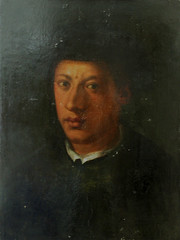A couple of weeks ago I gave a gallery talk in the Museum ‘Race and Rulership in Renaissance Florence’. The focus of the talk was a portrait of Alessandro de’ Medici (1511-1537), the first Duke of Florence. The V&A’s painting is based on a half-length portrait by Jacopo Pontormo (1494-1556). My talk was inspired by an article about Alessandro de’ Medici by John K. Brackett in the highly original book, ‘Black Africans in Renaissance Europe’. Brackett’s article revealed that Alessandro’s mother was thought to be a Moorish slave.
Now, how about this for a fortuitous coincidence? I was in the early stages of researching representations of black people in the V&A’s medieval and Renaissance collections to create an online resource. I’d just finished reading Brackett’s book when I noticed a colleague had doodled the name Alessandro de’ Medici on a piece of paper. “What’s that you’re working on?”, I enquired. “Oh, just trying to write the label text for a painting that’s going into the gallery soon”. “A painting! Not a portrait of Alessandro de’ Medici?” Having literally just finished Brackett’s book, I hadn’t had time to check whether the Museum had any objects relating to Alessandro. Even if I had come across the four objects – two medals, a cameo and this oil painting – their catalogue entries would not have alerted me to the fact that Alessandro was mixed race.
I’ve now completed my research into ‘Black Africans in Medieval and Renaissance Art at the V&A’ and my work will be added to these web pages in the near future. This turned out to be my last piece of work as an Assistant Curator at the Museum, as I left for pastures new the day I completed it. Being African and Caribbean myself and interested in this period more than any, I feel extremely fortunate to have worked on such a fascinating project. I hope the online resource will increase awareness of the relationship between Africa and Europe during the Middle Ages and particularly during the Renaissance, the period in which the large-scale enslavement and sale of Africans by Europeans began. Next year this country will commemorate the bicentenary of the abolition of the slave trade but I wonder how many will also think of slavery within the wider context of the Renaissance?
